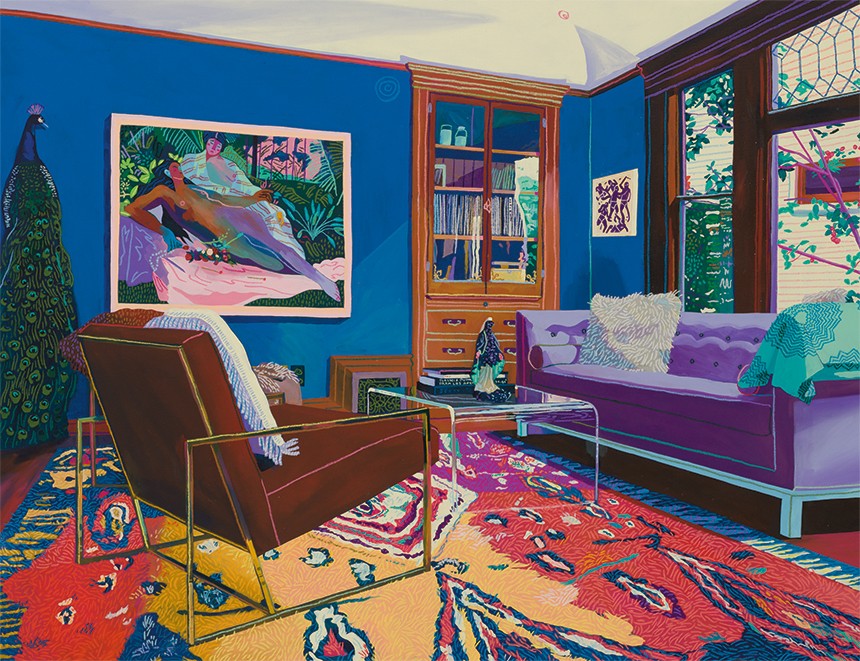The idea of a dramatist writing a play within a play or a screenwriter penning a film about making a film is a recurrent theme on stage and on screen. However, a painting containing the image of another painting is currently perceived as unconventional practice in the art world—especially when it comes from Andy Dixon. The concept of capturing existing works of art on canvas first became popular in the 16th century, but Dixon, with his historical know-how, has been able to bring the technique back in vogue. His fixation stems from the way the Vancouver-born, LA-based artist considers the idea of opulence. Works that have conveyed this the most have been exhibited at New York’s Joshua Liner Gallery last year. That sense of intrigue and curiosity has continued in his current work.
The opulent art of Andy Dixon
A conversation with artist Andy Dixon on the intersection of art and commerce.
By Caleigh Alleyne - May 28th 2021
“Of course, I believe in art so I’m not trying to cheapen the magic of it,” says Dixon, “but at the same time, you could also look at an artist as someone who just makes products to sell.” In a sense, the artist believes that art is, in its own way, a luxury item to own. Which is why Dixon’s work is a conversation between art and commerce—his paintings touch on how the two can live, work and experiment together. “I think there is a lot of comedy and taboo that exists in the gray area of those two concepts,” he says.
In the Patron’s Home series, Dixon recreates his own paintings in domestic scenes set in the homes of those who now own the works. Detailing anonymous and intricate living spaces in LA, Hong Kong, London and New York, the Patron’s Home series is devoted entirely to patrons as it is a contemporary interpretation of the tradition of artists painting their own masterpieces (as seen most notably in Henri Matisse’s The Red Studio). In comparison, Dixon’s Patron’s Homeseries is an examination of the evolving relationship an artist has with his work following its purchase. “I wanted to highlight the commercial side of things,” says Dixon, “if a painting is now bought and sold, what happens to a work of art when it is out of my hands? ”

In Patron’s Home (Milan), the artist conjures an image of a living room flooded with bold art, stylish furnishings and an ornate rug. At first glance this appears to be a simple scene in a contemporary home, but on the wall is a revelation: Dixon’s own work, Allegory of Music Painting (2019), acquired by the homeowner, has been recreated within the new canvas. “In the way that Andy Warhol played with Campbell’s soup cans as a signifier of pop culture, I am playing with old paintings,” says Dixon, intrigued by the pop culture interpretation of art history.
Self-taught since he first picked up a brush, Dixon’s color choices are instinctual rather than informed by years of technical study. His style was developed through trial and error. “For source material I’m looking at various eras of art history like Flemish still life and Renaissance reclining nudes, things don’t really have much strife in them. I’m looking to appropriate images that are full of desire.”
What is most unexpected in Dixon’s work is his connection to his punk rock roots, where he first began experimenting with silk screening techniques and layering colors for his bands D.B.S. and The Red Light Sting, and his Vancouver-based independent music label, Ache Records. Dixon’s color theory was also developed as a response to his exploration of the interactions in a palette of 20 custom-made paints. The same deep dedication to the exploration of shades and hues is something he sees in in established and emerging art spaces everywhere.
“I’ve been noticing there has been a rise in young artists who really know how to paint technically well,” remarks Dixon. “But what you do with that technical prowess is [key]... because you still have to say something important.”
Related articles
-
Go to articleLifestyle
Navigating New Orleans
By Elio Iannacci - October 24th 2024
A journey through the Creole, Cajun and contemporary flavors of Louisiana’s most vibrant city.
-
Go to articleLifestyle
Byron Bay Bliss
By Kelly Stock - October 23rd 2024
Australia’s idyllic and iconic eastern coastline.
Latest articles
-
Go to articleFeatured Aircraft
Super Powered
By Christopher Korchin - October 24th 2024
The Bombardier Global 7500 and the Bombardier Global 8000 are the industry’s most spacious ultra-long-range business jets. But they also excel in performance on short runways, opening up a world of prized destinations.
-
Go to articleProfiles
Family Affair
By Stephen Johnson - November 29th 2024
From a snowmobile manufacturer to a global leader in business aviation, Bombardier’s enduring legacy is built on innovation and family values.



